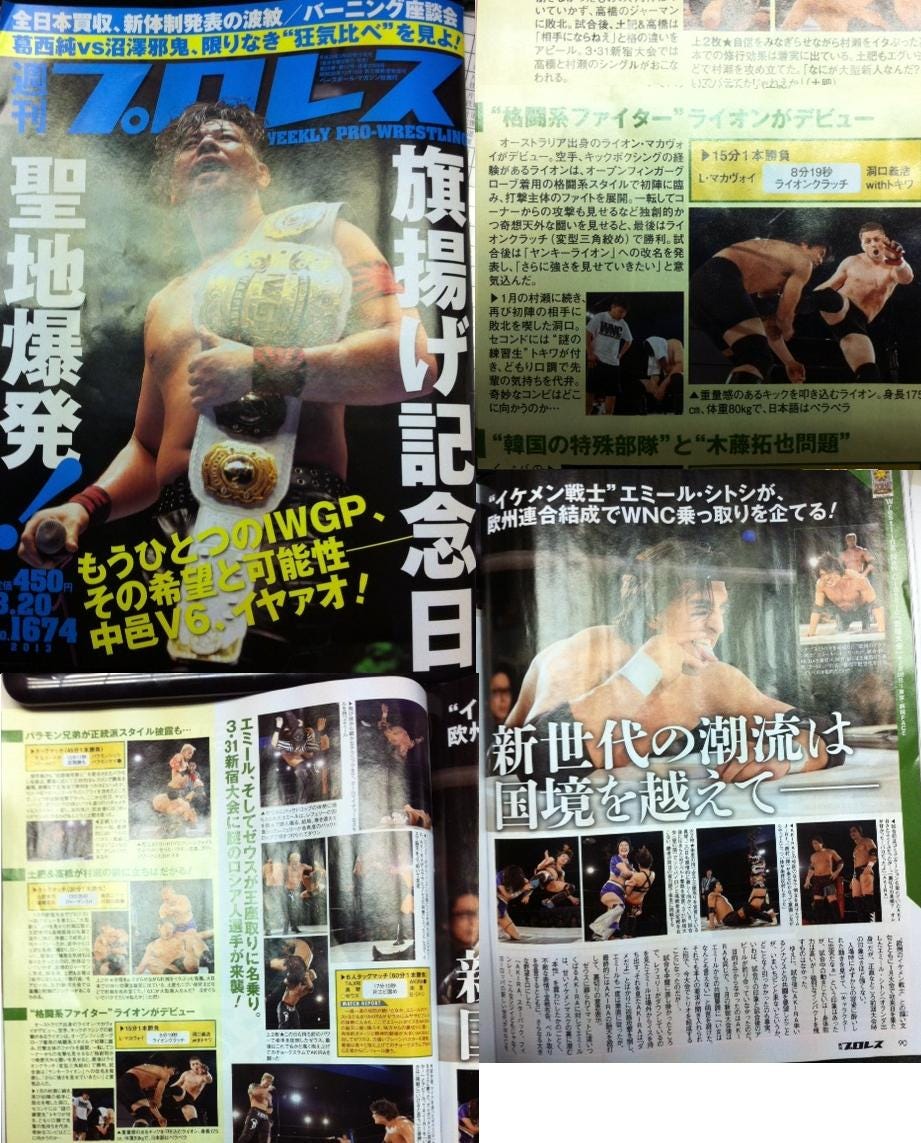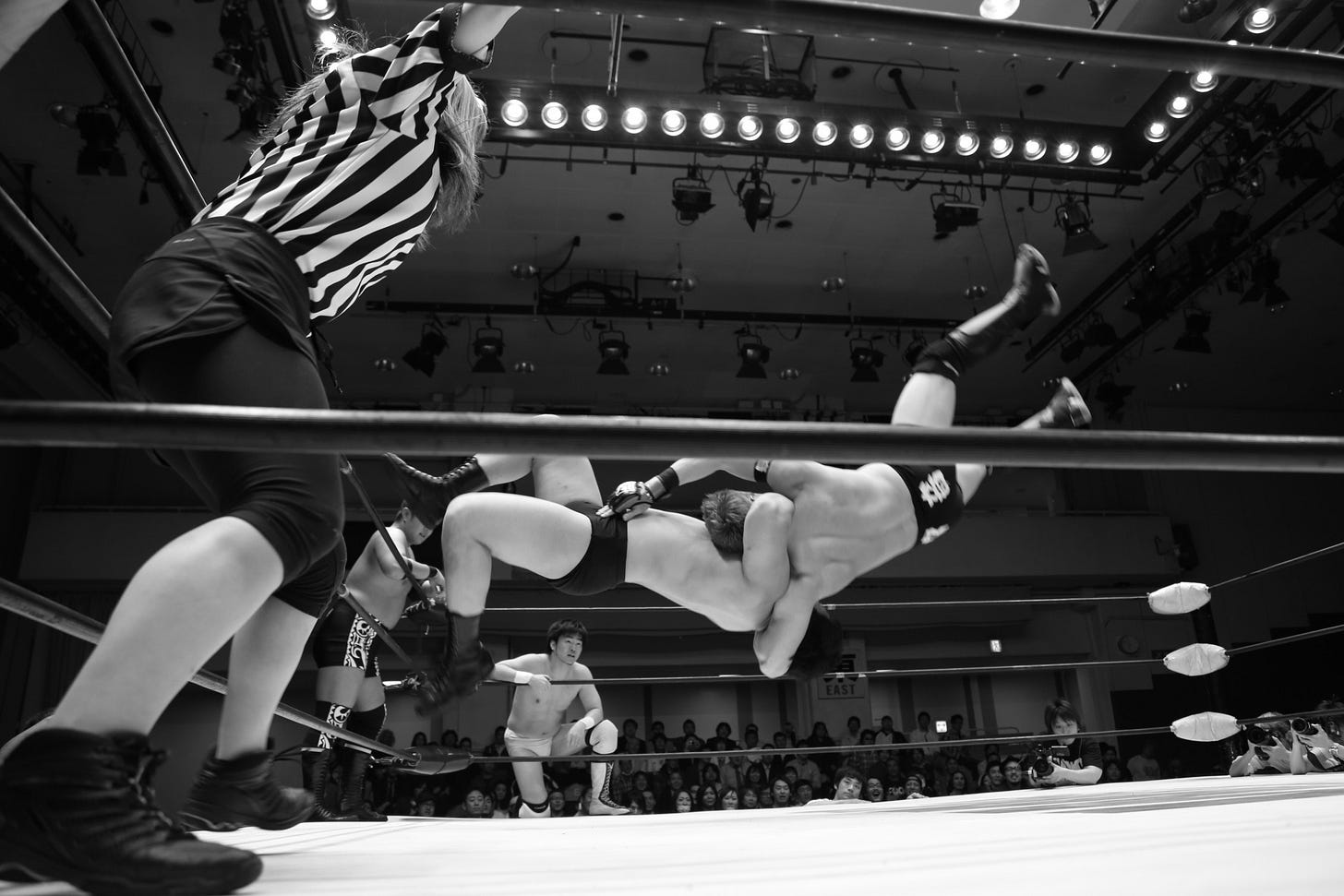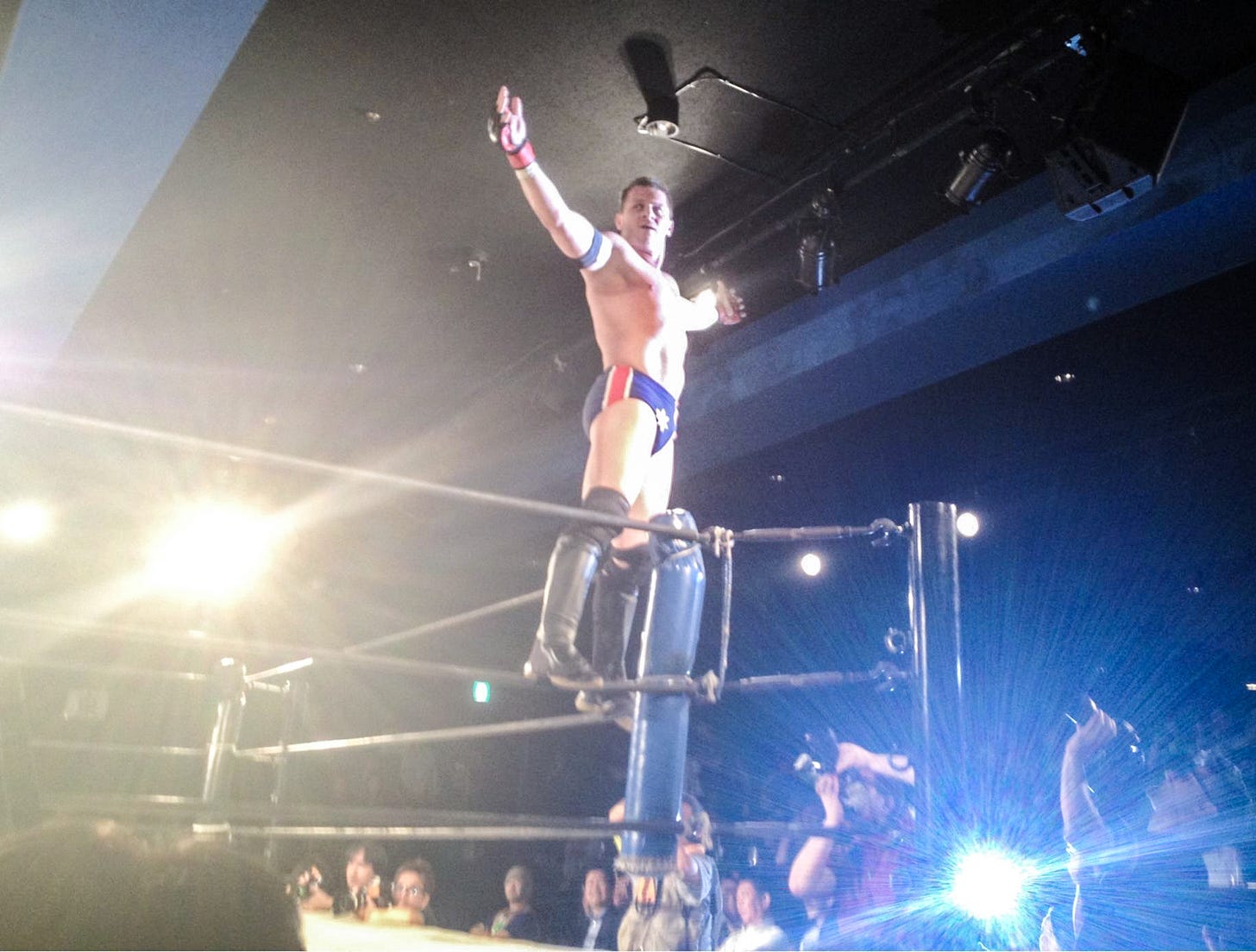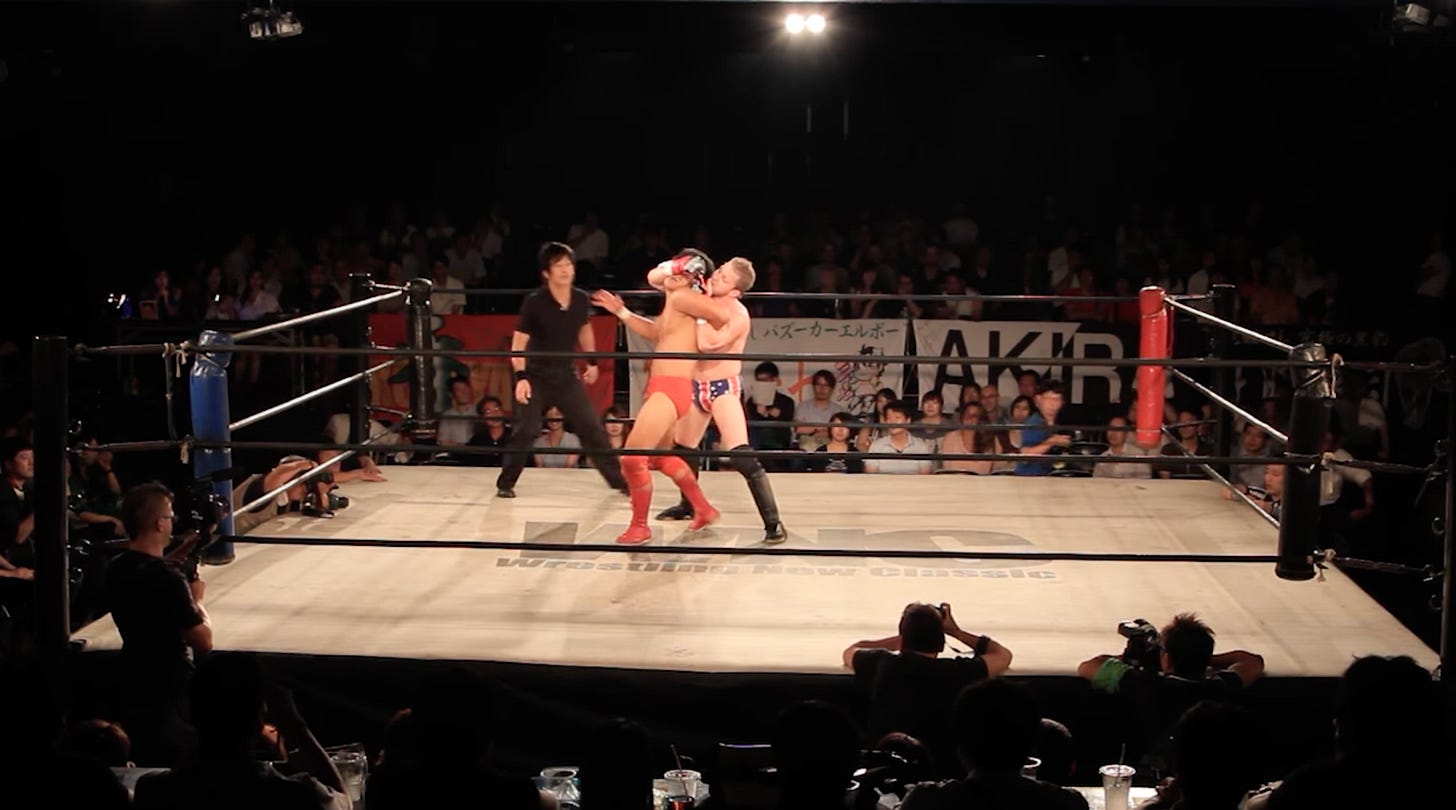This is part 7 of the “becoming a pro wrestler in Japan” series that I have been writing about. I purposely left some time between parts 6 and 7, mainly to let things simmer and to give me time to think about how to attack this section. Becoming Fujiwara had a lot of moving parts, and I wanted to get it all out of my head clearly.
I became Rionne Fujiwara on Halloween night, October 31st, 2013. I absolutely hated the Yankee Rionne name and couldn’t wait to get rid of it. In saying that, I could have almost become Rionne Funaki instead, after the great Pancrase legend Masakatsu Funaki, but things have a funny way of working out.
Let’s rewind a little.
I’ve just made my debut at Shinjuku Face. It’s the 28th of February, 2013, and I am on top of the world. My Facebook that night reflected it, as I searched twitter and Facebook for a month of Sundays, in pursuit of every single photo of the event that I could find. I saved them all, and uploaded every one of them to Facebook. It was my chance to show everyone “hey look at me, I made it!”…. but for a lot of people back in Australia, they had no idea what the hell was going on. I didn’t tell too many people I was journeying into the Japanese Pro Wrestling world because they wouldn’t have understood what that meant. If it wasn’t “oooooh hell yeah!” or “if ya smeeellllll….” then it didn’t mean anything to anyone I knew. In fact, when I uploaded the photos of my debut match, a lot of people reacted with “wait, Japan has a wrestling league?”…
Yes, Japan has a wrestling league. Well to be more precise, it has an industry. It’s a very unique one, and one that will never change the way it works and runs so long as the art and sport are alive.
I mentioned previously that I had to do the exact same match as my debut, two days later in Yokohama. This would be my REAL introduction to Japanese pro wrestling. The “trained” crowds of Shinjuku Face (where it’s mandatory to buy at least 1 alcoholic beverage, or at least get a soda) and Korakuen Hall are not the real Japanese wrestling crowds. Those Korakuen and Face fans are great! They are loud, they cheer your name, they know their job. But the real Japanese pro wrestling crowds (different from the word “fans” as I am talking about the overall atmosphere of the arena) are in your local towns in the countryside. What do I mean by real? I mean, a real reflection of the Japanese people, and a real “untrained” crowd. They sit there in SILENCE. They are very polite and cheer quietly. If you do something good, the only nod you will get is a golf clap and a quick and sharp “oh!”. The fans here also rarely boo, no matter how much you try to get them involved. Remember, I am talking about the untrained fans, the ones that don’t attend the big arenas. I remember once being in Nara (Kansai region) and screaming out as I was beating up a local kid in the ring;
“This city is a piece of shit and you’re all trash”
Should I mention that I did this in Japanese? I would never speak in English because, well quite frankly, nobody would understand. I yelled out in a typical yankee (loud mouth loser) style of Japanese and the fans reacted with "your Japanese language level is amazing Lion!”
How ironic it is for me now, realising that when I was trying to be a “bad guy” in Japan meant being the Yankee loud mouth that Tajiri had wanted me to be all along. The irony is not lost on me and I only wish I would have stuck to his original intention for my character. Still, we cannot live life full of regret. We must move forward and learn from our mistakes in everything we do.
As I tried to make fans angry by calling their town trash, I got the opposite reaction. They responded by praising me and this is Japan and the Japanese in a nutshell. If you are familiar with honne and tatemae, you will know. If you aren’t, it’s pretty easy to understand. Honne refers to what we really think in our hearts: opinions, thoughts, desires... The two kanji characters translate roughly to "authentic sound" and to me clearly mean the "real voice" of an individual. Tatemae meanwhile, refers to the behavior that we adopt in public, according to what is socially accepted or not by Japanese society. It could be translated as the "public face".
The dual concepts of honne and tatemae are very important in Japanese culture. It governs life in Japanese society, and is basically the idea of what you are, and what you appear to be. Japanese professional wrestling crowds are therefore unique in three ways;
They are in public, and tatemae takes precedent. There are rules on how to behave in public. The West could learn a lot from it.
A lot of fans at countryside shows are watching wrestling for the first time, most likely roped into going by the guy who bought the uri-kogyou package. This package is a pre-sale show, where the wrestling company charges a set amount to a would-be promoter with stars and yen marks in his eyes. The company receives the money in advance, and the promoter keeps all the ticket sales. It usually ALWAYS ends horribly in a sea of red on the balance books and a vow to never run a wrestling show again. Others going for the first time will go because there is nothing else to do in the small countryside towns, or because a friend invited them (and probably paid for the ticket so they didn’t have to go alone).
Japanese wrestling fans are VERY knowledgable. They study the matches more than they watch them (due to its deep ties to MMA, judo, and sumo) and Japanese fans know bullshit when they see it. They also know a good wrestler when they see one. You will never hear a “you fucked up!” chant like in the West, but instead, if you do fuck up (make an obvious mistake mid-match), you will hear the dreaded “eeeeeeeeeeeee” yelp. I shudder now as I write this, imagining that sound in a match. It’s a sound unique to the Japanese people and is not pronounced like the i in igloo, instead like the middle of the words pear/pair. It is by far and away the WORST sound any professional wrestler in Japan could ever imagine being thrown at them. I’ll take a thousand “you fucked up” chants over this sound yet I am fortunate enough to have never been yelped at with that dreaded, horrible cry of utter disapproval. Poor Horaguchi though (my debut opponent) was known for constantly getting them and I remember Akira slapping the absolute shit out of him after a match once.
The WNC fans were different from the countryside folk though. They were behind your with all their hearts, but for other companies, during a lot of my matches all I would hear is “LION!!” and “ganbare!!” (do your best). In Tajiri’s matches outside WNC, he’d get the same, or sometimes they’d add the honorific “san” to the end, meaning Mister. “Tajiri san!” or just “Tajiri!”.
I was once told by my old tag partner Yoshinari Ogawa (the default tag partner for most gaijin in Pro Wrestling Noah) that 70-80% of fans at the regional countryside shows have never seen wrestling before. He put it very simply;
“None of us are ever going to get a reaction, just do your thing, finish the match, and let the next guy try”.
Right you are, Ogawa San.
What I meant by the fans being knowledgable was that, they appreciate the skill of the wrestler more than the antics. With Japanese professional wrestling so deeply tied to Japanese martial arts and western shoot style wrestling, the Japanese see it as a real fight. They suspend disbelief when possible. They are also very good at predicting who will win a contest and at first it baffled me as to why they could name 90% of the winners before a show even started. Here’s a hint, it wasn’t because they had inside information or they knew about injuries etc. It’s far more simple! All you have to do is look at wikipedia, see who has wrestled the longest, and you can easily predict the winner. There very rarely are such things as story arcs, senior guys putting over young talent, or plain and simple “what’s good for business”. What’s good for business in Japan is, the senior guy ALWAYS wins, and the foreigner has a job to do - to make the Japanese look good in a losing effort. I am totally fine with all of that because I honestly feel that I am a lucky boy to be wrestling here.
It sounds like I am digressing from the Fujiwara story, going on a tangent about the Japanese fans and how they reflect Japanese society, but I can assure that this is indeed no digression. I will tie it all in soon enough. Be patient Kemosabe.
Yokohama, March 2nd, 2013. My second match is over and I get a decent reaction from the fans, things are going well. Over the next few months, Tajiri booked me strong. He banned me from doing a lot of pro wrestling moves (including basics like running the ropes) and insisted on me being a shoot fighter who kicked the crap out of people. He didn’t care how hard I kicked, and other wrestlers such as Akira and Yusuke Kodama also actively encouraged it, teaching me where to place and not to place kicks. Remember though, I didn’t have a clue what a shoot fighter was! I was watching CM Punk’s rise to the summit of superstardom in the WWE and trying to copying his moves (as well as his trunks, and even at one point, his facial hair), when I probably should have been watching my namesake Yoshiaki Fujiwara, who I am ashamed to say, I had never heard of.

It’s now April of 2013, and WNC ran our first Korakuen Hall show for the year. If you read the previous posts, you will remember that Korakuen Hall costs almost $10,000 USD to rent, and that’s just for the basic package. If you want screens, projectors, lights… it all costs more. You will also remember that Kana’s (Asuka in WWE now) sponsor, the first WNC owner, quit in a rage of anger and a massive loss that his daddy was not happy about. WNC was taken over by Junko from Junko Oil (previous blog posts talk about this interesting company take over) and our monthly Korakuen Hall schedule of 2012 was now cut down to just two shows, in April and October. Lastly, if you read the previous posts, you’ll remember that Hajime Ohara was fired from WNC and with him being booted out the door, out also went Wrestling New Classic’s number 1 ticket seller. Step up Yankee Lion, to debut.
I was selling tickets like hot cakes, by far the number 1 ticket seller in the company. Tajiri was a happy camper;
“Rionne-san, you are paying my salary. Thank you for selling so many tickets”.
After some matches in March, including my first tag match against Syuri and Ikemen Jiro (I partnered with Ryo Mizunami) where I was completely lost like a deer in headlights, Tajiri put me in a 6 man tag match with the other young boys for the April Korakuen Hall show. I sold over 40 tickets for that show, despite being in a 6 man tag, second on the card. The fans didn’t really get hyped up at all for the match because it was a filler for other, more important matches.
Tajiri was impressed with my ticket sales though. He kept booking me strong (I rarely lost), slowly giving up on his banning of pro wrestling moves on me, and letting me be more free. This led to errors and a steep learning curve, but I was young and determined to do wrestling the way I saw it - silly, but we all learn from our mistakes. Tajiri honestly didn’t seem to mind because I was pulling in crowd numbers (again, not from being a star wrestler, but for being a great door to door salesmen). In March, April, May, and June, we wrestled on average 4 to 5 shows each month and I sold the most tickets for 13 straight shows.
On the 27th of June (I have this knack of remembering exact dates), I faced my debut opponent Horaguchi again at Shinjuku Face. I debuted my new trunks on this night, dropping the young boy black trunks and adopting the Australian flag colors as well as the Southern Cross - the stars that are on the Australian flag. I was also still wearing the red MMA gloves but would soon ditch these.
Pantera and Yusuke Kodama laughed, calling it the “legend match”. I couldn’t help but see the funny side of it. Horaguchi was so bad, yet I frequently had to wrestle him and it was tough. At least I got to win, but I would have much preferred to lose every time to a senior wrestler who could help me get better in the ring. On June 27th, I lit up Horaguchi with a display of martial arts kicks and the trained crowd (remember, it’s in Shinjuku Face) loved it. Tajiri’s mind was moving at a million miles an hour at any given time, but I could tell that he was happy with the reactions I was getting from the fans. Watch me kick the shit out of him in the video below. This was also the most “yankee” I would ever be in a match. Looking back in 2022 as I write this and watch the match over, I really wish I stuck with Tajiri’s original gimmick for me - a free-spirited Aussie guy in a Japanese wrestling ring.
Watch the match above. The crowd dies half way though because Horaguchi kept fucking up, fluffing opportunity after opportunity. He should have been benched AGAIN.
Interesting side note, an 18 year old Toni Storm was in the crowd, and later she would say that she thought I’d been wrestling for years. We are both from the Gold Coast in Queensland, Australia and were in contact for a while after that. Long before her Stardom days, she was over wrestling for Reina Women’s Wrestling, who would later save WNC from collapse and become its third owner in 3 years. I would often watch videos of her matches that she sent me and give her advice over Facebook, despite not actually having a clue what I was doing myself either. She later moved to England and became the amazing superstar that she is today with absolutely none of it my doing.
After the June 27th show, and moving into July, Tajiri’s face was changing a little. I was working in the office every day next to him, filming videos and editing them as well as doing the podcasts and other general social media stuff. He was getting worried, because it was now the Japanese summertime and the October 31st Korakuen Hall show was roughly three months away, right around the corner. I had sold a lot of tickets for the April Korakuen Hall show, but the other guys hadn’t. We had a very poor turnout and I imagine the company lost a lot of money. Tajiri was under pressure and he needed a way to sell tickets. He pulled me aside and sat me down.
“I am thinking about giving you a single match with a legend, how do you feel about that?”
I was a bit shocked to say the least. Single matches in WNC were very hard to come by. I’d been mostly in tag matches or 6 man tags, rarely having lost, but also never eating a pin or pinning someone (winning and losing) in these tag matches. My single matches were mostly at Shinjuku Face… but now I am getting one at Korakuen Hall? Against a Japanese legend?
“I am going to give you an angle where if you don’t get 100 foreigner’s signatures on a piece of paper to say they will buy a ticket, you don’t get the match”.
One thing about this - this was actually NOT an angle (a made up story for the fans). He told me straight up that if I didn’t get 100 gaijin (foreign person / non Japanese) signatures on a piece of paper, then the match would be off. The reason? Because a Japanese legend is expensive to book. Also most likely because he knew the other young boys were lazy and would not bother to sell tickets.
I asked him who I would be wrestling and he said “I’m not sure yet, but maybe either Fujiwara Kumicho or Masakatsu Funaki". Kumicho is slang for gang boss and is the character that Fujiwara portrays sometimes in the ring but mostly in the B movies or straight to DVD films that he acts in. I told Tajiri pretty bluntly;
“100 gaijin names will be very hard, but can I just get 100 names instead?”
He accepted but told me to keep that strictly to myself. He still believed in kayfabe and that also meant to the other wrestlers. And so the match was on - despite no opponent set.
July turned into August and Tajiri decided on Fujiwara as the opponent. He didn’t say why and I didn’t ask. We had another Shinjuku Face show on August 29th where Tajiri would plant the seeds for the Fujiwara match. I was to face Ikemen Jiro (currently kicking ass in WWE NXT) in a single match, and I would be winning. Soujiro (Jiro’s real name) was not too happy to start with, but on the day, he was great. Tajiri demanded the win also be by submission. I’m known as a submission guy now, but at the time, I was basically just a kicker. I thought long and hard, and decided to randomly use the cross face chicken wing for my finish, and I submitted Soujiro. I had never practiced it before and I’ve never use that move since.
After the match I got on the microphone and spoke these exact words to the Shinjuku Face crowd, in fluent Japanese.
“As some of your may know, I came to Japan from Australia 11 years ago. My dream of becoming a professional wrestler came true recently! The truth is, there are lots of foreign people living in Japan just like me. I want to be the beacon of hope for foreigners in Japan! I also want to become a great shoot style wrestler. In truth, I am already a great shoot wrestler, but I want to be the best! So, on October 31st at Korakuen Hall, I want to wrestle the wrestling master himself, Yoshiaki Fujiwara! What do you think? (big crowd cheer). I want to show all the foreigners in Japan that I can wrestle Fujiwara, I want to show them that dreams can come true! So this goes out to both Japanese and foreigners, please support me in my quest to fight Fujiwara!
During my speech, someone yelled out “You should wrestle Anjo!” and I stopped my “mic performance” (as the Japanese call it) and said “Sorry, I don’t know who Anjo is”. The Japanese crowd thought I was being a Yankee and laughed hard. Truth be told, just like Fujiwara himself, I really didn’t know who Yoji Anjo was at the time. How embarrassing.
“I want to be the beacon of hope for foreigners in Japan!”
Quite a bold statement for a rookie of just 6 months. To be exact, I debuted on February 28th, and just 6 months and 1 day later on August 29th, I was on a microphone calling out the wrestling master for a one on one match at Korakuen Hall. Of course the crowd had no idea what my “quest” to wrestle Fujiwara would be, or why I was talking about all the foreigners living in Japan. Naturally, these were all lines fed to me by Tajiri. He used to make us practice them before the show on the microphone and would often dictate exactly how each word and phrase should be said, down to every minute little detail. It was clear that this was Tajiri’s WNC and that Kana was a thing of the past.
This is the video of the match, and the interview afterwards. If you don’t believe that I grabbed a microphone in Japan and spoke to Japanese fans in Japanese, check out 8:32 of the video above. The Anjo part was funny too.
The crowd ATE IT UP. They absolutely loved it, and there was a buzz after the match.
“What is his quest?”
And
“How will he be the beacon of hope for foreigners in Japan?”
This is the genius of Tajiri. He tapped into the hearts of the fans. They were emotionally invested now and we had them hook, line, and sinker. How on earth could THE wrestling master (Tajiri’s words - he was adamant that I use this term) possibly be facing a fresh faced rookie of just 6 months? Unheard of! But I was a yankee by the Japanese definition of it, as well as a foreigner. I had TWO free pass cards that I was using. Basic story telling hasn’t changed since the beginning of mankind. Remember that I said that story telling doesn’t exist in Japanese professional wrestling? It does in Tajiri Land.
Let me now bring things full circle a little with the tie in with the fans and what type of people they are.
The WNC fans were VERY loyal. They were mostly all Tajiri, Syuri, Makoto, or Lin Byron fans, but they were loyal. Why were they loyal? Because the Japanese system of having a rookie do exhibition bouts before debuting means that the fans literally watch the wrestler grow up. They see a kid in a t-shirt and shorts wrestle for 3 minutes a few times, then they see him/her debut, and then they follow them on their path. As we grow as wrestlers, the idea is that the fan’s support for us also grows. In my case, wrestling Fujiwara was a BIG DEAL to the Japanese WNC fans. Here was one of their own, a kid they’d seen debut less than half a year earlier and a gaijin who had come through the Japanese system with zero previous wrestling experience nonetheless, now taking on a legend of the industry, in little WNC’s very own ring!
Tajiri was over the moon. The response from the crowd was amazing and the hard work was now to begin - mostly for me as I had to legitimately sell 100 tickets!
How many signatures do you think I got for that event? It’s obvious that I got at least 100, because the match went ahead and I became Fujiwara. However, you’ll be surprised to learn just how many I sold and how I did it.
Please tune into “Becoming Fujiwara - Part 2” for the second half of this story as I describe the night I made Japanese wrestling history by becoming the first and so far only gaijin to be christened with a Japanese surname in a Japanese wrestling ring. Stay tuned!











